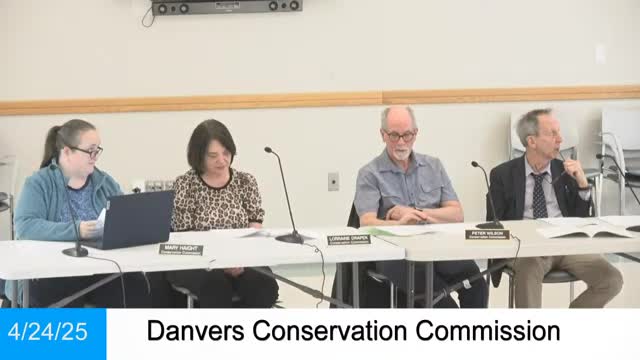Danvers conservation commission approves 61 High Street with waivers and conditions on snow storage and permeable paver maintenance
Get AI-powered insights, summaries, and transcripts
Subscribe
Summary
The Danvers Conservation Commission on April 24 approved an Order of Conditions for work at 61 High Street (DEP 14-1432), granting waivers and imposing monthly maintenance and signage requirements to protect adjacent wetlands.
The Danvers Conservation Commission on April 24 approved an Order of Conditions for work at 61 High Street (DEP file 14-1432), granting waivers that allow construction within the 35-foot no-disturb zone and the 50-foot no-build zone and adding several ongoing conditions for stormwater and site maintenance.
The project applicant, represented at the meeting by Bill Manuel of Wetlands and Land Management and engineer Jay Polakowitz of Hancock Associates, proposed an addition to the existing building, a deck and small landing and stairs that encroach into the 50-foot no-build area, a two‑car garage accessed by a permeable driveway, and an infiltration system consisting of six infiltrator units. Applicant Richard Bocelli said a realistic construction start would be spring 2026, with a possible fast‑track fall 2025 start.
The commission approved two separate waivers (work in the 35-foot no-disturb zone and the 50-foot no-build zone) and issued the Order of Conditions with conditions the commission added during discussion. Those conditions recorded at the meeting include: monthly inspection and maintenance of the permeable pavers in accordance with the submitted operation and maintenance plan (with vacuuming and aggregate replenishment if needed); posting a ‘‘No snow storage beyond this point’’ sign 15 feet back from the edge of the permeable pavers; and placement of Town of Danvers conservation boundary signs along the back property line at roughly 20‑ to 30‑foot intervals. The commission recorded that the additional conditions were incorporated into the motion and that staff (Emily) captured them in the record.
Commissioners and members of the public pressed on long-term maintenance and potential impacts to the adjacent wetland. Town meeting member Bill Bradstreet raised concern about contaminants and snow melt reaching conservation land behind the property and noted that permeable surfaces can clog and require cleaning. Amy Butler, a town meeting member, asked about tree removal and nesting birds and told the commission she had consulted a relative who is a conservation biologist. Butler cited the Migratory Bird Treaty Act and said, “you can't trim trees that have active nests in them” and urged that trees be checked before removal. The applicant said the row of Arborvitae at the back of the driveway will be removed and that tree removal would be scheduled for winter 2025 or timed to avoid nesting where feasible; he also said some plantings would be relocated to another Danvers property.
Technical details discussed at the meeting: the permeable paver system requires monthly cleaning (typically with a leaf blower) and periodic vacuuming if performance declines, in line with the Massachusetts Stormwater Handbook and the project maintenance plan. The infiltration system is being sized to manage up to a two‑year storm event given tight soils and a relatively high groundwater table; at the meeting the consultant described the system as a shallow one with roughly 1 foot of top spacing (top of system to finished grade) and approximately 2 feet of separation above groundwater at test locations.
The commission closed the public hearing, voted to grant the waivers and to issue the Order of Conditions with the additional maintenance and signage conditions; the roll-call style vote at the end of the meeting was recorded as unanimous. The commission noted the project permit includes ongoing inspection and maintenance obligations and that staff will monitor compliance.
The commission asked the applicant to return for any unresolved items and reminded that typical conservation approvals carry time limits for follow-up; staff recorded the additional conditions in the project file.
